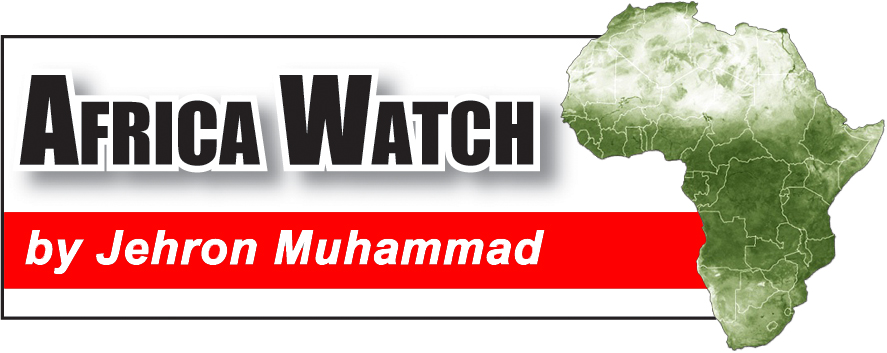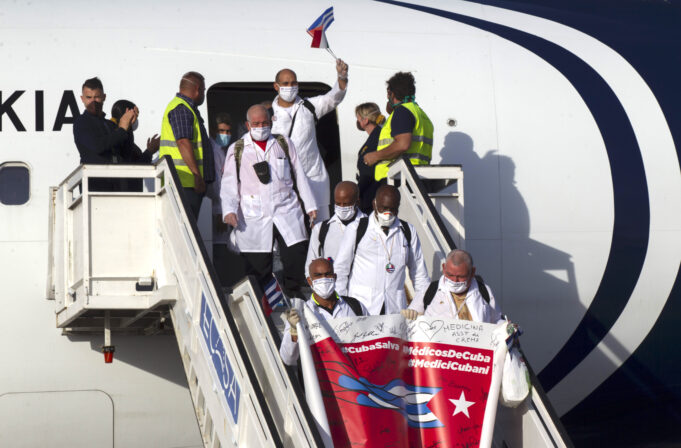“First and foremost, we have to understand and look at ourselves and say we have the power to make change,” said Dr. Arabia Mollete, a board-certified emergency medicine physician and graduate of Cuba’s Latin American School of Medicine.

Participating in a video forum and one of eight panelists, including six Cuba medical school trained physicians, Dr. Mollete shared her coronavirus pandemic experiences.
On “March 8 when all hell broke loose,” she used her Cuba medical school training to help save mostly Black and Brown lives of patients at Brooklyn’s Brookdale Hospital Medical Center.
Dr. Mollete’s training includes the use of what is called “Pesquisaje.” It translates as: “Active surveillance and risk identification screening to help control the outbreak of transmissible and infectious diseases,” said Dr. Desta Muhammad, who acted as the forum’s co-moderator along with Final Call editor Naba’a Muhammad.
According to the Journal of Developing Societies, Cuba’s tried and tested medical care system, which includes student medical or health care training, is free or available at a nominal fee “focuses on (preventative measures including) consultation with patients and local communities, disease prevention, directing scarce resources toward the groups most in need, especially expectant mothers, infants, children, and the infirmed elderly. Cuba practices social medicine, dealing more with the conditions that lead to poor health—nutrition, potable water, sanitation, vaccination, mosquito control—giving less focus to expensive curative treatments.”
Overcoming a brick wall Dr. Mollete ran into, in terms of gaining access to personal protective equipment and other necessities needed to deal with the pandemic, she “utlized the media to get the message out, because we were going into three weeks without getting any type of help.”
In fact, she said, her hospital and the surrounding community “were actually on the same track as Italy (with its initial large numbers of infected and dead) to the point where myself and the rest of my colleagues, (the majority of these ER doctors were Black) had to make decisions of unfortunately who was going to get help. Basically, who was going to live and not going to live. And that was the most heartbreaking experience all of us had to deal with.”
When CNN decided to come to the hospital, the hospital’s vice president asked her to do the interview, Dr. Mollete was asked to “speak from my heart.”
“And I said … No one is helping us. We are dying over here, the entire state of New York as well as the government has completely ignored us. And all the support was going to places like Columbia Presbyterian, Mt. Sinai, NYU, where all the financial backing and its supplies were going there,” said Dr. Mollette. (Dr. Mollette has worked and taught emergency medicine in Ghana, Nigeria, Sierra Leon, and every year during the month of January in Kenya and periodically in the U.S. Virgin Islands.)
The second thing she did “was utilize the resources that were in front of us.”
“We ran out of ventilator machines, I actually taught the residents how to make one MacGyver style,” she said, referring to the TV show of the same name where a fictional agent uses knowledge and whatever material available to overcome problems.
“And so that is how I decided to bring that training, a part of the Cuban training into the mix including utilizing media,” explained Dr. Mollette.
She also wrote for the local press requesting help from the wider community with cell phones and tablets so families could communicate with hospitalized loved ones who had contracted the coronavirus.
Then she organized taking her colleagues to the streets.
“So the whole work and afterwork we’d go out in the street and we’d see whoever was on the corner, whoever was not complying with social distancing or physical distancing at the beginning and say, ‘Listen, this is what’s happening. I need you to go into the community and tell all your brothers, all your gang members, all your crew members to stay at home,’ ” said Dr. Mollette.
Other doctors participating in the two-hour panel discussion included the program coordinator of Cuba’s Latin American School of Medicine, Dr. Melissa Barber; board certified family medicine physician Dr. Mayyada Muhammad; Dominican Republic-born Dr. Narcisco Ortiz, who worked on Covid-19 testing sites in different parts of the U.S., alongside board certified, internal medicine specialist and integrated medicine fellow Dr. Sitembile Sales.
Opening up the discussion was Dr. Sales and her power point presentation. She showed how Blacks and Latinos are dying at faster rates than any other groups from Covid-19.
“When Covid-19 came around it exposed the weaknesses in America’s health care system. There was no structure in place. Nothing was developed to confront this pandemic,” said Dr. Sales. She pointed out that people lost their jobs but were not given paid sick leave and increasing numbers of people were left without medical insurance.
During the discussion she pointed out how treatments related to “Covid-19 that had been published months ago in publications around the world” are just now showing up in the U.S. corporate-owned press without giving Cuba credit.
It should be common knowledge that when the pandemic hit Wuhan, China in March, it was China’s use of Cuba’s Interferon Alfa 2B that helped mitigate the disease, she said.
But if you read a recent Washington Post article, “Several trials are underway giving patients immune proteins called interferons either alone or in combination with other treatments, to see if they speed recovery.”
There was no mention of Cuba and its successful treatments around the globe utilizing Interferon to help mitigate the Covid-19 pandemic.
In the Post, Dr. Anthony S. Fauci, director of NIH’s National Institute of Allergy and Infectious Diseases, said, without giving Cuba and its biotech industry any credit, said, “Interferons are immune proteins that normally interfere with a virus’ life cycle—hence the name, interferon.”
The Post author near the end of the article writes as though the Cubans hadn’t been utilizing interferon since the 1980s. The Post article says, “Researchers caution that many questions remain unanswered about interferon’s use in coronavirus patients. Past clinical studies that tested it to treat SARS and MERS show little or no benefit.”
There is no indication that the Post tried to contact Cuba’s state-run and state of the art biopharmaceutical Finlay Institute for a statement.
Dr. Mayyada Muhammad, based in Atlanta, praised Cuba for its proactive approach to health care. “America doesn’t have a true health care system,” she said. “Cuba has the measures in place to deal with (the) … pandemic most definitely what we’re dealing with now with Covid-19. And the difference between being here and working in Cuba is that (Cuba) is very proactive in its approach to dealing with infectious diseases,” said Dr. Muhammad. “Here in the United States its more reactive, it’s not a proactive-like plan.”
Dr. Muhammad referenced Min. Louis Farrakhan’s July 4 speech, especially where it applied to Cuba and how it could help the U.S. in mitigating its pandemic.
Min. Farrakhan said, “Don’t we (U.S.) need something that Cuba has. Yet we have an embargo on Cuba.”
“We want our Cuban doctors to look after us,” Min. Farrakhan continued.
Warning against unsafe vaccine taking, the 87-year-old spiritual leader, who has in the past expressed much respect and given much honor and praise to the Cuban people and Commandant Fidel Castro, said, “I say to my brothers and sisters in Africa … if they come up with a vaccine, be careful.”
“Do not take their medications. We need to call a meeting of our skilled virologists, epidemiologists, and students of biology and chemistry. We need to give ourselves something better,” he said.
(Follow @jehronmuhammad on Twitter.)













